.jpg)

.jpg)
THE REWARDS FOR THOSE WHO FEAR ALLAH
They are given joyful tidings whilst on Earth
As for those people who lead their lives on Earth without fearful awareness of Allah, we will examine below, in the light of the Qur'an, the inexplicable fears they experience and the awesome severity of Allah's majesty. Those, on the other hand, who fear Allah and are cautious, will, in direct contrast, attain in the Hereafter total security from all types of fear and lead their lives under Allah's protection and grace. Those true believers who throughout their lives have felt a deep foreboding at the prospect of the Fire when the Day of Judgment arrives, will be kept far away from every kind of fear and will be absolutely safe. Whilst Allah gives these glad tidings in the Qur'an, on the Last Day He will address His servants and announce many more glad tidings:
"My servants, you will feel no fear today; you will know no sorrow." As for those who believed in Our Signs and became Muslims: "Enter the Garden, you and your wives, delighting in your joy."
Platters and cups of gold will passed around among them and they will have there all that their hearts desire and their eyes find delight in. You will remain in it timelessly, for ever.
"That is the Garden you will inherit for what you did."
"There will be many fruits in it for you to eat." (Surat az-Zuhkruf: 68-73)
In other Qur'anic verses, Allah will give these glad tidings through the mediation of his angels, which will be without a doubt an incredible joy for believers who so intensely hope for the Garden:
The angels descend on those who say, "Our Lord is Allah," and then go straight: "Do not fear and do not grieve but rejoice in the Garden you have been promised. We are your protectors in the life of this world and the Hereafter. You will have there all that your selves could wish for. You will have there everything you demand. Hospitality from One who is Ever-Forgiving, Most Merciful." (Surah Fussilat: 30-32)
The Qur'an stresses that these glad tidings, which last for eternity and are full of goodness, will be attained by those who truly believed during their lives on Earth.
A beautiful life
The lives of those who do not believe in Allah, who do not fear him and who do not behave cautiously will, in keeping with the punishment they deserve, be deprived of the abundance and blessings reserved for believers:
If only the people of the cities had believed and guarded against evil, We would have opened up to them blessings from heaven and Earth. But they denied the truth so We seized them for what they earned. (Surat al-A'raf: 96)
However, those who believe in Allah with fearful awareness, and have shown good character in their conduct, will be given glad tidings in the life Hereafter of Heaven, and in this world will benefit in the best possible manner from Allah's kindness and abundance:
Anyone who acts rightly, male or female, being a believer, We will give them a good life and We will recompense them according to the best of what they did. (Surat an-Nahl: 97)

Similar to the way in which the infinite punishment of the disbelievers begins whilst on Earth, for cautious, true believers, the promised infinite goodness will also begin to manifest. As a result of abundance and beauty being amongst the foremost features of the Garden, Allah will provide His beloved, fearful servants with a taste of these blessings during their lives on Earth in order to increase their longing and desires for the Garden.
By the same token, Allah will protect the believers from every form of anxiety and distress during their lives because of their adherence to His commands and prohibitions, because of their living according to His religion and, most importantly, because of their constant reliance on Him, their patience, and their longing for the Hereafter. Instead of distress, Allah causes to descend upon their hearts a feeling of peace and security. In every act of worship or good conduct, big or small, they are aware that Allah is watching them and, that the recording angels record it all in the book of their deeds, hence, they experience a tranquillity that is brought about by the knowledge that in the Hereafter they will be rewarded for it all.
On the other hand, however, there is another point that should not be forgotten: the world is a place of trial. Most certainly, a true believer could be confronted with various hardships and crises. However, whatever the situation, for a believer who fears Allah these difficulties turn out to be a mercy and a reward. A good example of this is the Prophet Ibrahim (Abraham) (as) who, having been accused of lying and in spite of being on the point of being thrown into the fire by his people, he did not make even the slightest compromise in his beliefs or waver in his submission or in his trust in Allah.
Without doubt being burnt alive is a terrible punishment but in the case of Prophet Ibrahim (as) Allah had ordered the fire to be "coolness and peace" for him and it did not cause him any pain or suffering. Distress, harm and misfortune are a punishment or warning which occur only as a result of a person's own incorrect manner and bad behavior: "Any disaster that strikes you is through what your own hands have earned…" (Surat ash-Shura: 30).
Otherwise, for a sincere believer who fears Allah to the best of his ability and who is constantly mindful of Allah's approval in his conduct, punishment is not an issue.
All the hardships which true believers experience in this world are confronted as tests which only enhance the respect and fearful awareness they have towards Allah, as well as further increasing their desire for the Garden. A true believer is aware that these hardships are created for him as a trial and a learning experience, and as opportunities for displaying good conduct, exercising patience and as long as he relies on Allah, as an opportunity for reward in the Hereafter. The Qur'an mentions the particular quality of being able to view all events as an opportunity, in connection with those who truly believe and who are fearfully aware of Allah:
When those who fear Allah are asked, "What has your Lord sent down?" their reply is, "Good!" There is good in this world for those who do good, and the abode of the Hereafter is even better. How wonderful is the abode of the righteous [who fear Allah]. (Surat an-Nahl: 30)
The death of a true believer who has lived on Earth in righteousness will be good and easy, his afterlife will commence with the welcoming of angels, and its continuation will be the comfort and ease that awaits every true believer.
An everlasting life in the Garden
But those who fear their Lord will have Gardens with rivers flowing under them, remaining in them timelessly, for ever: hospitality from Allah. What is with Allah is better for those who are truly good. (Surah Al 'Imran: 198)
What is the Garden promised to the righteous [who fear Allah] like? It has rivers flowing under it and its foodstuffs and cool shade never fail. That is the final fate of the righteous [who fear Allah]. But the final fate of the disbelievers is the Fire. (Surat ar-Ra'd: 35)
Believers who fear an encounter with the infinite punishment of Hell, and who are mindful of not rebelling against Allah, will gain the reward of those who fear and act cautiously as Allah has promised, and they will be sent to enter their eternal home:
And those who feared their Lord will be driven to the Garden in companies and when they arrive there, finding its gates open, its custodians will say to them, "Peace be upon you! You have done well so enter it timelessly, for ever." They will say, "Praise be to Allah Who has fulfilled His promise to us and made us the inheritors of this land, letting us settle in the Garden wherever we want. How excellent is the wage of those who work!" (Surat az-Zumar: 73-74)
For the true believers who enter the Garden, the most joyful surprise and the greatest source of happiness and excitement above all else, will be a verbal salutation from Allah:
"Peace!" A word from a Merciful Lord. (Surah Ya Sin: 58)
Allah will address the true believers in the Garden as follows:
My devotees, you will feel no fear today; you will know no sorrow. (Surat az-Zukhruf: 68)
Allah, Who created mankind, is more aware than we are of what we would enjoy most as a reward for having believed in Him, and these very things are what will await the believers in the Garden. Hence, the immense blessings of the Garden and the wonders it contains lie far beyond the scope of human imagination. Infinite blessings will be offered to believers the likes of which no eyes have ever seen and no ear has ever heard; for the rest of eternity everything they encounter will meet with their every desire:
.jpg)
… They will have whatever they wish for with their Lord. That is the great favor. (Surat ash-Shura: 22)
The Qur'an describes every aspect of everlasting life for the believers in the Garden, such as their places of residence, their clothing, their spouses, the beauty of the surroundings, the foodstuffs and various other delights that await them.
In one Qur'anic verse the eternal lives led by those who fear Allah and the terrifying end to be faced by those who do not fear Allah are compared:
An image of the Garden which is promised to the righteous [who fear Allah]: in it there are rivers of water which will never spoil and rivers of milk whose taste will never change and rivers of wine, delightful to all who drink it, and rivers of honey of undiluted purity; in it they will have fruit of every kind and forgiveness from their Lord. Is that like those who will be in the Fire timelessly, for ever, with boiling water to drink which lacerates their bowels? (Surah Muhammad: 15)
There is no doubt that someone who is conscious and aware needs only to reflect on the scenario for a moment in order for both hope in and fear of Allah to intensify.
The greatest reward: Allah's eternal satisfaction with them
Allah has promised the men and women of the believers Gardens with rivers flowing under them, remaining in them timelessly, for ever, and fine dwellings in the Gardens of Eden. And Allah's good pleasure is even greater. That is the great victory. (Surat at-Tawba, 72)
The greatest spiritual pleasure experienced by believers when they enter the Garden is the reality that from that moment on Allah is pleased with them, that He loves them, that He will never punish them, and that they will be His friends for eternity. To have gained Allah's approval will be the source of a joy and happiness infinitely superior to any earthly comparison. Allah's pleasure is what brings the ultimate sweetness to the blessings of the Garden. Although the rewards of the Garden are wonderful in themselves, what is more delightful still is the joy of being affirmed by The Lord of all the Worlds as being worthy of receiving His kindness. The Qur'an states:
O self at rest and at peace, return to your Lord, well-pleasing and well-pleased! Enter among My servants! Enter My Garden. (Surat al-Fajr: 27-30)

The Unique Artistry Of Fruits And Vegetables
 Fruits and vegetables spring from the same soil and are watered with the same water, yet they come in a dazzling variety. When we consider the multitude of different tastes and smells of fruits and vegetables, the question of how such a variety ever came about in the first place comes to mind. What causes this miscellany of the tastes and fragrances of grapes, melons, kiwis, pineapples and the like, using the same water and minerals for centuries on end, yet without ever mixing them up with each other and without ever getting them confused? Allah gives them their matchless tastes and appearances.
Both animals and humans obtain the energy they need to survive through nutrition which is produced by plants. In other words, plants have been created as a blessing to benefit all living things. Most of these blessings have been designed especially for humans. Let's take a look at our surroundings, at what we eat, and then think. First let's look at the bone-dry stalk and very thin roots of a grape vine. This bone-dry structure, one that seems so fragile that it could be broken with the slightest pull, can produce dozens of kilos of juicy grapes whose color, smell and taste have been designed especially to give pleasure to man. Now let's think about watermelons. This juicy fruit, which again comes out of dry soil, develops precisely in the season when people begin to feel the need for it, that is, in summer. Let's think about the marvelous smell of the melon that has been provided since it first came into existence, without any deterioration in its quality, and about its famous taste. When fragrances are produced in factories, people use complex quality controls and take great pains to produce a uniform odor that mimics nature; but there is no need for quality checks to preserve the natural odor of fruits.
In addition to their enticing smells, each fruit also contains ingredients that are suitable to the season. In winter, for example, we have tangerines and oranges, which are full of vitamin C and energy. Vegetables also possess any and all kinds of vitamins and minerals that living things may need.
By thinking in this manner, we could examine in turn all the plants present in nature. And at the end of this examination, we would have learned that the plants around us have been especially designed for human beings and all other creatures, in other words they have been created. Allah, Who is the Lord of the worlds, has brought into existence all nutrition for living things and has created them in such a way that the taste, smell and use of each one of them is wonderfully varied. This reveals His might and matchless artistry in creation. He informs us of this in the Qur'an:
Fruits and vegetables spring from the same soil and are watered with the same water, yet they come in a dazzling variety. When we consider the multitude of different tastes and smells of fruits and vegetables, the question of how such a variety ever came about in the first place comes to mind. What causes this miscellany of the tastes and fragrances of grapes, melons, kiwis, pineapples and the like, using the same water and minerals for centuries on end, yet without ever mixing them up with each other and without ever getting them confused? Allah gives them their matchless tastes and appearances.
Both animals and humans obtain the energy they need to survive through nutrition which is produced by plants. In other words, plants have been created as a blessing to benefit all living things. Most of these blessings have been designed especially for humans. Let's take a look at our surroundings, at what we eat, and then think. First let's look at the bone-dry stalk and very thin roots of a grape vine. This bone-dry structure, one that seems so fragile that it could be broken with the slightest pull, can produce dozens of kilos of juicy grapes whose color, smell and taste have been designed especially to give pleasure to man. Now let's think about watermelons. This juicy fruit, which again comes out of dry soil, develops precisely in the season when people begin to feel the need for it, that is, in summer. Let's think about the marvelous smell of the melon that has been provided since it first came into existence, without any deterioration in its quality, and about its famous taste. When fragrances are produced in factories, people use complex quality controls and take great pains to produce a uniform odor that mimics nature; but there is no need for quality checks to preserve the natural odor of fruits.
In addition to their enticing smells, each fruit also contains ingredients that are suitable to the season. In winter, for example, we have tangerines and oranges, which are full of vitamin C and energy. Vegetables also possess any and all kinds of vitamins and minerals that living things may need.
By thinking in this manner, we could examine in turn all the plants present in nature. And at the end of this examination, we would have learned that the plants around us have been especially designed for human beings and all other creatures, in other words they have been created. Allah, Who is the Lord of the worlds, has brought into existence all nutrition for living things and has created them in such a way that the taste, smell and use of each one of them is wonderfully varied. This reveals His might and matchless artistry in creation. He informs us of this in the Qur'an:And also the things of varying colors He has created for you in the earth. There is certainly a Sign in that for people who pay heed. (Surat an-Nahl, 13)

HOW FAR BACK DO TRACES OF MAN GO? WHY DO THESE NOT SUPPORT EVOLUTION?
WE need to turn to the fossil record to find an answer to the question of when man appeared on Earth. This record shows that man goes back millions of years. These discoveries consist of skeletons and skulls, and the remains of people who lived at various times. One of the oldest traces of man are the "footprints" found by the famous palaentologist Mary Leakey in 1977 in Tanzania's Laetoli region.
These remains caused a great furore in the world of science. Research indicated that these footprints were in a 3.6-million-year-old layer. Russell Tuttle, who saw the footprints, wrote:
A small barefoot Homo sapiens could have made them... In all discernible morphological features, the feet of the individuals that made the trails are indistinguishable from those of modern humans. 1
Impartial examinations of the footprints revealed their real owners. In reality, these footprints consisted of 20 fossilized footprints of a 10-year-old modern human and 27 footprints of an even younger one. Such famous paleoanthropologists as Don Johnson and Tim White, who examined the prints found by Mary Leakey, corroborated that conclusion. White revealed his thoughts by saying:
Make no mistake about it,... They are like modern human footprints. If one were left in the sand of a California beach today, and a four-year old were asked what it was, he would instantly say that somebody had walked there. He wouldn't be able to tell it from a hundred other prints on the beach, nor would you. 2
These footprints sparked an important debate among evolutionists. That was because for them to accept that these were human footprints would mean that the imaginary progression they had drawn up from ape to man could no longer be maintained. However, at this point dogmatic evolutionist logic once again showed its face. Most evolutionist scientists once more abandoned science for the sake of their prejudices. They claimed that the footprints found at Laetoli were those of an ape-like creature. Russell Tuttle, who was one of the evolutionists defending this claim, wrote:
In sum, the 3.5 million-year-old footprint traits at Laetoli site G resemble those of habitually unshod modern humans. None of their features suggest that the Laetoli hominids were less capable bipeds than we are. If the G footprints were not known to be so old, we would readily conclude that there were made by a member of our genus Homo... In any case, we should shelve the loose assumption that the Laetoli footprints were made by Lucy's kind, Australopithecus afarensis. 3
Another of the oldest remains to do with man was the ruins of a stone hut found in the Olduvai Gorge region by Louis Leakey in the 1970s. The remains of the hut were found in a layer 1.7 million years old. It is known that structures of this kind, of which similar examples are still used in Africa in the present day, could only be built by Homo sapiens, in other words modern man. The significance of the remains is that they reveal that man lived at the same time as the so-called ape-like creatures that evolutionists portray as his ancestors.
A 2.3 million-year-old modern human jaw found in the Hadar region of Ethiopia was very important from the point of view of showing that modern man had existed on the Earth much longer that evolutionists expected.4
One of the oldest and most perfect human fossils is KNM-WT 1500, also known as the "Turkana Child" skeleton. The 1.6 million-year-old fossil is described by the evolutionist Donald Johanson in these terms:
He was tall and thin, in body shape and limb proportions resembling present-day equatorial Africans. Despite his youth, the boy's limb nearly matched the mean measurements for white North American adult males. 5
It is confirmed that the fossil was that of a 12-year-old boy, who would have been 1.83 metres tall in adolescence. The American paleoanthropologist Alan Walker said that he doubted that "the average pathologist could tell the difference between the fossil skeleton and that of a modern human." Concerning the skull, Walker wrote that he laughed when he saw it because "it looked so much like a Neanderthal."6
One of the human fossils that has attracted the most attention was one found in Spain in 1995. The fossil in question was uncovered in a cave called Gran Dolina in the Atapuerca region of Spain by three Spanish paleoanthropologists from the University of Madrid. The fossil revealed the face of an 11-year-old boy who looked entirely like modern man. Yet, it had been 800,000 years since the child died. This fossil even shook the convictions of Juan Luis Arsuaga Ferreras, who lead the Gran Dolina excavation. Ferreras said:
We expected something big, something large, something inflated-you know, something primitive… Our expectation of an 800,000-year-old boy was something like Turkana Boy. And what we found was a totally modern face.... To me this is most spectacular-these are the kinds of things that shake you. Finding something totally unexpected like that. Not finding fossils; finding fossils is unexpected too, and it's okay. But the most spectacular thing is finding something you thought belonged to the present, in the past. It's like finding something like-like a tape recorder in Gran Dolina. That would be very surprising. We don't expect cassettes and tape recorders in the Lower Pleistocene. Finding a modern face 800,000 years ago-it's the same thing. We were very surprised when we saw it. 7
As we have seen, fossil discoveries give the lie to the claim of "the evolution of man." This claim is presented by some media organizations as if it were a proven fact, whereas all that actually exist are fictitious theories. In fact, evolutionist scientists accept this, and admit that the claim of "the evolution of man" lacks any scientific evidence.
For instance, by saying, "We appear suddenly in the fossil record" the evolutionist paleontologists C. A. Villie, E. P. Solomon and P. W. Davis admit that man emerged all of a sudden, in other words with no evolutionary ancestor.8
Mark Collard and Bernard Wood, two evolutionist anthropologists were forced to say, "existing phylogenetic hypotheses about human evolution are unlikely to be reliable." in an article they wrote in 2000. 9
Every new fossil discovery places evolutionists in an even worse quandary, even if certain frivolous newspapers do print headlines such as "Missing link discovered." The fossil skull discovered in 2001 and named Kenyanthropus platyops is the latest example of this. The evolutionist paleontologist Daniel E. Lieberman from Washington University's Department of Anthropology had this to say about Kenyanthropus platyops in an article in the leading scientific journal, Nature:
 3.6-million-year-old human footprints found in Laetoli, Tanzania. |
These remains caused a great furore in the world of science. Research indicated that these footprints were in a 3.6-million-year-old layer. Russell Tuttle, who saw the footprints, wrote:
A small barefoot Homo sapiens could have made them... In all discernible morphological features, the feet of the individuals that made the trails are indistinguishable from those of modern humans. 1
Impartial examinations of the footprints revealed their real owners. In reality, these footprints consisted of 20 fossilized footprints of a 10-year-old modern human and 27 footprints of an even younger one. Such famous paleoanthropologists as Don Johnson and Tim White, who examined the prints found by Mary Leakey, corroborated that conclusion. White revealed his thoughts by saying:
Make no mistake about it,... They are like modern human footprints. If one were left in the sand of a California beach today, and a four-year old were asked what it was, he would instantly say that somebody had walked there. He wouldn't be able to tell it from a hundred other prints on the beach, nor would you. 2
These footprints sparked an important debate among evolutionists. That was because for them to accept that these were human footprints would mean that the imaginary progression they had drawn up from ape to man could no longer be maintained. However, at this point dogmatic evolutionist logic once again showed its face. Most evolutionist scientists once more abandoned science for the sake of their prejudices. They claimed that the footprints found at Laetoli were those of an ape-like creature. Russell Tuttle, who was one of the evolutionists defending this claim, wrote:
In sum, the 3.5 million-year-old footprint traits at Laetoli site G resemble those of habitually unshod modern humans. None of their features suggest that the Laetoli hominids were less capable bipeds than we are. If the G footprints were not known to be so old, we would readily conclude that there were made by a member of our genus Homo... In any case, we should shelve the loose assumption that the Laetoli footprints were made by Lucy's kind, Australopithecus afarensis. 3
 The remains of a 1.7-million-year-old stone hut |
Another of the oldest remains to do with man was the ruins of a stone hut found in the Olduvai Gorge region by Louis Leakey in the 1970s. The remains of the hut were found in a layer 1.7 million years old. It is known that structures of this kind, of which similar examples are still used in Africa in the present day, could only be built by Homo sapiens, in other words modern man. The significance of the remains is that they reveal that man lived at the same time as the so-called ape-like creatures that evolutionists portray as his ancestors.
A 2.3 million-year-old modern human jaw found in the Hadar region of Ethiopia was very important from the point of view of showing that modern man had existed on the Earth much longer that evolutionists expected.4
One of the oldest and most perfect human fossils is KNM-WT 1500, also known as the "Turkana Child" skeleton. The 1.6 million-year-old fossil is described by the evolutionist Donald Johanson in these terms:
He was tall and thin, in body shape and limb proportions resembling present-day equatorial Africans. Despite his youth, the boy's limb nearly matched the mean measurements for white North American adult males. 5
It is confirmed that the fossil was that of a 12-year-old boy, who would have been 1.83 metres tall in adolescence. The American paleoanthropologist Alan Walker said that he doubted that "the average pathologist could tell the difference between the fossil skeleton and that of a modern human." Concerning the skull, Walker wrote that he laughed when he saw it because "it looked so much like a Neanderthal."6
 In its December 1997 edition, Discover, one of the most popular evolutionist magazines, placed an 800,000-year-old human face on its cover, alongside a headline taken from evolutionists' surprised statement, "Is this the face of our past?" |
We expected something big, something large, something inflated-you know, something primitive… Our expectation of an 800,000-year-old boy was something like Turkana Boy. And what we found was a totally modern face.... To me this is most spectacular-these are the kinds of things that shake you. Finding something totally unexpected like that. Not finding fossils; finding fossils is unexpected too, and it's okay. But the most spectacular thing is finding something you thought belonged to the present, in the past. It's like finding something like-like a tape recorder in Gran Dolina. That would be very surprising. We don't expect cassettes and tape recorders in the Lower Pleistocene. Finding a modern face 800,000 years ago-it's the same thing. We were very surprised when we saw it. 7
As we have seen, fossil discoveries give the lie to the claim of "the evolution of man." This claim is presented by some media organizations as if it were a proven fact, whereas all that actually exist are fictitious theories. In fact, evolutionist scientists accept this, and admit that the claim of "the evolution of man" lacks any scientific evidence.
For instance, by saying, "We appear suddenly in the fossil record" the evolutionist paleontologists C. A. Villie, E. P. Solomon and P. W. Davis admit that man emerged all of a sudden, in other words with no evolutionary ancestor.8
Mark Collard and Bernard Wood, two evolutionist anthropologists were forced to say, "existing phylogenetic hypotheses about human evolution are unlikely to be reliable." in an article they wrote in 2000. 9
EVOLUTIONISTS' VOLTE-FACE REGARDING THE NEANDERTHALS
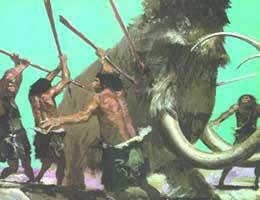  1975 PORTRAYAL OF NEANDERTHALS - Geheimnisse der Urzeit, Deutsche Übersetzung, 1975 (left) 2000 PORTRAYAL OF NEANDERTHALS - National Geographic, July 2000 (right) |
 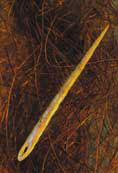 Since the beginning of the twentieth century, evolutionists have been portraying the Neanderthals, a vanished human race, as semi-ape creatures. The above portrayal of Neanderthals was used as evolutionist propaganda for decades. However, since the 1980s this myth has begun to collapse. Both fossil studies and traces of Neanderthal culture have shown that these people were not semi-apes. For example, this 26,000-year-old needle proved that Neanderthals were civilised humans who possessed the ability to sew. As a result of this, evolutionist publications such as National Geographic had to start portraying them as civilised, as in the picture below. |
Every new fossil discovery places evolutionists in an even worse quandary, even if certain frivolous newspapers do print headlines such as "Missing link discovered." The fossil skull discovered in 2001 and named Kenyanthropus platyops is the latest example of this. The evolutionist paleontologist Daniel E. Lieberman from Washington University's Department of Anthropology had this to say about Kenyanthropus platyops in an article in the leading scientific journal, Nature:
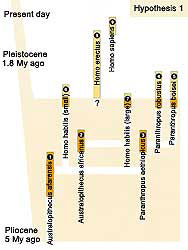 | 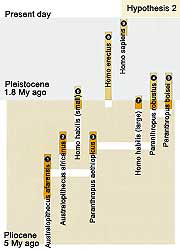 |
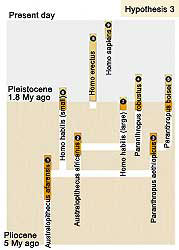 | Despite 150 years of propagandistic evolutionist research into the origin of man, the fossils discovered show that the first human beings suddenly appeared on the Earth, with no "apelike ancestor." The three different hypotheses on this page illustrate three different and contradictory evolutionist scenarios (Stephen Jay Gould, The Book of Life, 2001). Looking carefully, we can see that there is a question mark in front of Homo erectus, which is shown as the first human race on Earth. The reason for this is that there is no "ape-like" creature that evolutionists can show as being the "ancestor of man." Species in the illustrations, which lack anything linking them to man, are actually extinct species of ape. The origin of man, as we can see, is a mystery for evolutionists, because that origin is not evolution at all, but creation. |
The evolutionary history of humans is complex and unresolved. It now looks set to be thrown into further confusion by the discovery of another species and genus, dated to 3.5 million years ago… The nature of Kenyanthropus platyops raises all kinds of questions, about human evolution in general and the behaviour of this species in particular. Why, for example, does it have the unusual combination of small cheek teeth and a big flat face with an anteriorly positioned arch of the cheekbone? All other known hominin species with big faces and similarly positioned cheekbones have big teeth. I suspect the chief role of K. platyops in the next few years will be to act as a sort of party spoiler, highlighting the confusion that confronts research into evolutionary relationships among hominins. 10
The latest evidence to shatter the evolutionary theory's claim about the origin of man is the new fossil Sahelanthropus tchadensis unearthed in the Central African country of Chad in the summer of 2002.
The fossil has set the cat among the pigeons in the world of Darwinism. In its article giving news of the discovery, the world-renowned journal Nature admitted that "New-found skull could sink our current ideas about human evolution."11
Daniel Lieberman of Harvard University said that "This [discovery] will have the impact of a small nuclear bomb." 12
The reason for this is that although the fossil in question is 7 million years old, it has a more "human-like" structure (according to the criteria evolutionists have hitherto used) than the 5 million-year-old Australopithecus ape species that is alleged to be "mankind's oldest ancestor." This shows that the evolutionary links established between extinct ape species based on the highly subjective and prejudiced criterion of "human similarity" are totally imaginary.
John Whitfield, in his article "Oldest Member of Human Family Found" published in Nature on July, 11, 2002, confirms this view quoting from Bernard Wood, an evolutionist anthropologist from George Washington University in Washington:
"When I went to medical school in 1963, human evolution looked like a ladder." he [Bernard Wood] says. The ladder stepped from monkey to man through a progression of intermediates, each slightly less ape-like than the last. Now human evolution looks like a bush. We have a menagerie of fossil hominids... How they are related to each other and which, if any of them, are human forebears is still debated.13
The comments of Henry Gee, the senior editor of Nature and a leading paleoanthropologist, about the newly discovered ape fossil are very noteworthy. In his article published in The Guardian, Gee refers to the debate about the fossil and writes:
Whatever the outcome, the skull shows, once and for all, that the old idea of a "missing link" is bunk... It should now be quite plain that the very idea of the missing link, always shaky, is now completely untenable. 14
As we have seen, the increasing number of discoveries is producing results opposed to the theory of evolution, not in favour of it. If such an evolutionary process had happened in the past, there should be many traces of it, and each new discovery should further strengthen the theory. In fact, in The Origin of Species, Darwin claimed that science would develop in just that direction. In his view, the only problem facing his theory in the fossil record was a lack of fossil discoveries. He hoped that future research would unearth countless fossils to support his theory. However, subsequent scientific discoveries have actually proved Darwin's dreams to be totally unfounded.
The importance of human-linked remains
The discoveries regarding man, of which we have seen a few examples here, reveal very important truths. In particular, they have once again demonstrated what a great product of fantasy the evolutionists' claim that man's ancestor was an ape-like creature is. For this reason, it is out of the question that these ape species could be man's ancestors. In conclusion, the fossil record shows us that man came into existence millions of years ago in just the same form as he is now, and that he has come down to the present with absolutely no evolutionary development. If they claim to be genuinely scientific and honest, evolutionists should throw their imaginary progression from ape to man into the bin at this point. The fact that they do not give up this spurious family tree shows that evolution is not a theory that is defended in the name of science, but rather a dogma they are struggling to keep alive in the face of the scientific facts.
1. Ian Anderson, "Who made the Laetoli footprints?" New Scientist, vol. 98, 12 May 1983, p. 373
2. D. Johanson & M. A. Edey, Lucy: The Beginnings of Humankind, New York: Simon & Schuster, 1981, p. 250
3. R. H. Tuttle, Natural History, March 1990, pp. 61-64
4. D. Johanson, Blake Edgar, From Lucy to Language, p.169
5. D. Johanson, Blake Edgar, From Lucy to Language, p.173
6. Boyce Rensberger, Washington Post, 19 October 1984, p. A11
7. "Is This The Face of Our Past," Discover, December 1997, pp. 97-100
8. Villee, Solomon and Davis, Biology, Saunders College Publishing,1985, p. 1053
9. Hominoid Evolution and Climatic Change in Europe, Volume 2, Edited by Louis de Bonis, George D. Koufos, Peter Andrews, Cambridge University Press 2001, chapter 6, (emphasis added)
10. Daniel E. Lieberman, "Another face in our family tree," Nature, March 22, 2001, (emphasis added)
11. John Whitfield, "Oldest member of human family found," Nature, 11 July 2002
12. D.L. Parsell, "Skull Fossil From Chad Forces Rethinking of Human Origins," National Geographic News, July 10, 2002
13. John Whitfield, "Oldest member of human family found," Nature, 11 July 2002
14. The Guardian, 11 July 2002

A Conference on the Collapse of the Theory of Evolution in the Darwin Conference Hall - 26.02.2008
United Kingdom/The Daily Telegraph

The latest evidence to shatter the evolutionary theory's claim about the origin of man is the new fossil Sahelanthropus tchadensis unearthed in the Central African country of Chad in the summer of 2002.
  The Gran Dolina cave in Spain, where the Atapuerca fossil, of a true human being, was found. |
Daniel Lieberman of Harvard University said that "This [discovery] will have the impact of a small nuclear bomb." 12
The reason for this is that although the fossil in question is 7 million years old, it has a more "human-like" structure (according to the criteria evolutionists have hitherto used) than the 5 million-year-old Australopithecus ape species that is alleged to be "mankind's oldest ancestor." This shows that the evolutionary links established between extinct ape species based on the highly subjective and prejudiced criterion of "human similarity" are totally imaginary.
John Whitfield, in his article "Oldest Member of Human Family Found" published in Nature on July, 11, 2002, confirms this view quoting from Bernard Wood, an evolutionist anthropologist from George Washington University in Washington:
"When I went to medical school in 1963, human evolution looked like a ladder." he [Bernard Wood] says. The ladder stepped from monkey to man through a progression of intermediates, each slightly less ape-like than the last. Now human evolution looks like a bush. We have a menagerie of fossil hominids... How they are related to each other and which, if any of them, are human forebears is still debated.13
The comments of Henry Gee, the senior editor of Nature and a leading paleoanthropologist, about the newly discovered ape fossil are very noteworthy. In his article published in The Guardian, Gee refers to the debate about the fossil and writes:
Whatever the outcome, the skull shows, once and for all, that the old idea of a "missing link" is bunk... It should now be quite plain that the very idea of the missing link, always shaky, is now completely untenable. 14
As we have seen, the increasing number of discoveries is producing results opposed to the theory of evolution, not in favour of it. If such an evolutionary process had happened in the past, there should be many traces of it, and each new discovery should further strengthen the theory. In fact, in The Origin of Species, Darwin claimed that science would develop in just that direction. In his view, the only problem facing his theory in the fossil record was a lack of fossil discoveries. He hoped that future research would unearth countless fossils to support his theory. However, subsequent scientific discoveries have actually proved Darwin's dreams to be totally unfounded.
The importance of human-linked remains
The discoveries regarding man, of which we have seen a few examples here, reveal very important truths. In particular, they have once again demonstrated what a great product of fantasy the evolutionists' claim that man's ancestor was an ape-like creature is. For this reason, it is out of the question that these ape species could be man's ancestors. In conclusion, the fossil record shows us that man came into existence millions of years ago in just the same form as he is now, and that he has come down to the present with absolutely no evolutionary development. If they claim to be genuinely scientific and honest, evolutionists should throw their imaginary progression from ape to man into the bin at this point. The fact that they do not give up this spurious family tree shows that evolution is not a theory that is defended in the name of science, but rather a dogma they are struggling to keep alive in the face of the scientific facts.
1. Ian Anderson, "Who made the Laetoli footprints?" New Scientist, vol. 98, 12 May 1983, p. 373
2. D. Johanson & M. A. Edey, Lucy: The Beginnings of Humankind, New York: Simon & Schuster, 1981, p. 250
3. R. H. Tuttle, Natural History, March 1990, pp. 61-64
4. D. Johanson, Blake Edgar, From Lucy to Language, p.169
5. D. Johanson, Blake Edgar, From Lucy to Language, p.173
6. Boyce Rensberger, Washington Post, 19 October 1984, p. A11
7. "Is This The Face of Our Past," Discover, December 1997, pp. 97-100
8. Villee, Solomon and Davis, Biology, Saunders College Publishing,1985, p. 1053
9. Hominoid Evolution and Climatic Change in Europe, Volume 2, Edited by Louis de Bonis, George D. Koufos, Peter Andrews, Cambridge University Press 2001, chapter 6, (emphasis added)
10. Daniel E. Lieberman, "Another face in our family tree," Nature, March 22, 2001, (emphasis added)
11. John Whitfield, "Oldest member of human family found," Nature, 11 July 2002
12. D.L. Parsell, "Skull Fossil From Chad Forces Rethinking of Human Origins," National Geographic News, July 10, 2002
13. John Whitfield, "Oldest member of human family found," Nature, 11 July 2002
14. The Guardian, 11 July 2002

A Conference on the Collapse of the Theory of Evolution in the Darwin Conference Hall - 26.02.2008
United Kingdom/The Daily Telegraph

An article in the 26 February, 2008, issue of The Daily Telegraph, one of Britain’s widest read dailies with a circulation of 1 million, reported a conference on “The Collapse of the Theory of Evolution” at London University. Based on the works of Harun Yahya, the conference had an inexplicably disturbing impact on one evolutionist professor:
... I usually ignore it (creationism) but this week at University College London it’s hard to do so. The place is plastered with posters from the medical students’s Islamic Society inviting us to celebrate the “collapse of the evolution theory” witha lecture by a creationist in “the very building dedicated to Charles Darwin, on the spot he once lived”...


Declaring his belief in God Dr. Brian Cox, one of the scientists who espoused the idea that the universe came into existence as the result of a Big Bang, said “I respect people who have strong religious beliefs..”*
Fourteen centuries ago the Qur’an also revealed that the entire universe had emerged by expanding from its original very small mass, just as revealed by the Big Bang:
Today’s modern scientific discoveries confirm the reality revealed by the verses of the Qur’an. The universe came into being through God’s creation not, as materialists believe, through a series of coincidences, and the information we receive from God about the origin of the universe is without doubt the most accurate of all.
*http://magicstatistics.com/category/science/natural-history/evolution/


... I usually ignore it (creationism) but this week at University College London it’s hard to do so. The place is plastered with posters from the medical students’s Islamic Society inviting us to celebrate the “collapse of the evolution theory” witha lecture by a creationist in “the very building dedicated to Charles Darwin, on the spot he once lived”...


The Theoretician of the Big Bang Has Declared His Belief in God / Daily Sabah / 12.04.2007
Declaring his belief in God Dr. Brian Cox, one of the scientists who espoused the idea that the universe came into existence as the result of a Big Bang, said “I respect people who have strong religious beliefs..”*
Fourteen centuries ago the Qur’an also revealed that the entire universe had emerged by expanding from its original very small mass, just as revealed by the Big Bang:
Do those who do not believe not see that the heavens and the earth were sewn together and then We unstitched them and that We made from water every living thing? So will they not believe? (Surat al-Anbiya, 30)
Today’s modern scientific discoveries confirm the reality revealed by the verses of the Qur’an. The universe came into being through God’s creation not, as materialists believe, through a series of coincidences, and the information we receive from God about the origin of the universe is without doubt the most accurate of all.
*http://magicstatistics.com/category/science/natural-history/evolution/

| SALAMANDER
Age: 125 million years oldSize: salamander: 11 centimeters (4.3 in) by 6 centimeters (2.4 in) long; matrix: 29.6 centimeters (11.7 in) Location: Huludao City, Liaoning Province Formation: Jiufotang Formation Period: Lower Cretaceous |

This fossil salamander uncovered in China is the world's oldest known salamander. As a result of some sudden volcanic eruption, fossil remains are often very well preserved under a layer of ash, so well that it is even possible to detect some of their soft tissues and the last food they ate.

AL-HALEEM, (The All-Clement, The Lenient)
The Qur'an, which Allah revealed from His Sight to humanity, is the last Just Book. It still exists in its pure and uncorrupted state, for He has promised to preserve it, and He always keeps His promises. In this Book, Allah explains how to serve Him, what is allowed and what is prohibited, gives the good news that those who devote their lives to Him and strive to earn His good pleasure will enter Paradise and remain therein forever, and that those who turn their backs upon Him will enter Hell and be punished for all eternity.
Yet despite these facts, the majority of people disregard the Qur'an, and some of them never pick it up at all. Ignoring Allah's verses, they indulge in this world's pleasures and never worry about having to account for themselves after death or their next life. Ignoring the limits that He has set, they do not display the moral excellence Allah expects from them, share their possessions with others, or help them when they are in need. Furthermore, when they are called to have faith in Allah, they claim to know what they are doing. Very few of them have a genuine faith in Allah and meticulously comply with His commands.
Some reflection upon these facts can help us comprehend Allah's infinite compassion and mercy. Although unbelievers intentionally turn their faces away from the just religion and transgress the limits set by Allah, He does not punish them right away. Rather, He grants them various blessings and allows them to live in abundance.
Moreover, He gives them time so that they may see the truth and return to the straight path. Islam is easy to practice, another expression of Allah's infinite mercy. In addition, He does not hold people responsible for their forgetfulness or their mistakes, and does not impose any responsibility upon the blind, the lame, and the sick. He relieves people's burdens by instructing them about patience and trust in Him. All of these examples are enough to grasp Allah's infinite mercy and compassion and the unbelievers' ungratefulness.
We need to keep another point in mind as well: Allah is infinitely just and, both in this world and the next, He will recompense people according to the best of what they did. This attribute is related in several verses, as follows:

BOSPHORUS PRESS CONFERENCE (June 8, 2007, Istanbul)

AL-HALEEM, (The All-Clement, The Lenient)
Those of you who turned their backs on the day the two armies clashed—it was Satan who made them slip for what they had done. But Allah has pardoned them. Allah is Ever-Forgiving, Lenient . (Surah Al ‘Imran, 155)
The Qur'an, which Allah revealed from His Sight to humanity, is the last Just Book. It still exists in its pure and uncorrupted state, for He has promised to preserve it, and He always keeps His promises. In this Book, Allah explains how to serve Him, what is allowed and what is prohibited, gives the good news that those who devote their lives to Him and strive to earn His good pleasure will enter Paradise and remain therein forever, and that those who turn their backs upon Him will enter Hell and be punished for all eternity.
Yet despite these facts, the majority of people disregard the Qur'an, and some of them never pick it up at all. Ignoring Allah's verses, they indulge in this world's pleasures and never worry about having to account for themselves after death or their next life. Ignoring the limits that He has set, they do not display the moral excellence Allah expects from them, share their possessions with others, or help them when they are in need. Furthermore, when they are called to have faith in Allah, they claim to know what they are doing. Very few of them have a genuine faith in Allah and meticulously comply with His commands.
Some reflection upon these facts can help us comprehend Allah's infinite compassion and mercy. Although unbelievers intentionally turn their faces away from the just religion and transgress the limits set by Allah, He does not punish them right away. Rather, He grants them various blessings and allows them to live in abundance.
Moreover, He gives them time so that they may see the truth and return to the straight path. Islam is easy to practice, another expression of Allah's infinite mercy. In addition, He does not hold people responsible for their forgetfulness or their mistakes, and does not impose any responsibility upon the blind, the lame, and the sick. He relieves people's burdens by instructing them about patience and trust in Him. All of these examples are enough to grasp Allah's infinite mercy and compassion and the unbelievers' ungratefulness.
We need to keep another point in mind as well: Allah is infinitely just and, both in this world and the next, He will recompense people according to the best of what they did. This attribute is related in several verses, as follows:
Allah will not take you to task for inadvertent statements in your oaths, but He will take you to task for the intention your hearts have made. Allah is Ever-Forgiving, Lenient. (Surat al-Baqara, 225)
The seven heavens and Earth and everyone in them glorify Him. There is nothing that does not glorify Him with praise, but you do not understand their glorification. He is Lenient, Ever-Forgiving. (Surat al-Isra', 44)
Allah keeps a firm hold on the heavens and Earth, preventing them from vanishing. And if they vanished, no one could then keep hold of them. Certainly He is Lenient, Ever-Forgiving. (Surah Fatir, 41)

BOSPHORUS PRESS CONFERENCE (June 8, 2007, Istanbul)
Mr. ADNAN OKTAR (HARUN YAHYA) Honorary President of The Science Research Foundation (BAV)
"One Single Islam"... Years at Mimar Sinan University... Communism, Fascism, Freemasonry are based on Darwinism... Turkic Nations should be together under a single roof... Worldwide effects of Atlas of Creation... We are welcoming the Golden Age...


Free Book Center

BASIC TENETS OF ISLAM
"One Single Islam"... Years at Mimar Sinan University... Communism, Fascism, Freemasonry are based on Darwinism... Turkic Nations should be together under a single roof... Worldwide effects of Atlas of Creation... We are welcoming the Golden Age...


Free Book Center
You can read and download all of Harun Yahya's books in e-book format free of charge on this site.

BASIC TENETS OF ISLAM
Everyone has some knowledge and convictions about Islam. However, the majority of these convictions have their origins in inadequate or incorrect sources. Actually, what one has to do to know Islam is to study the Qur’an, which comprises the origin and basis of Islam. Based on the information conveyed in the Qur’an, this book gives an account of God’s attributes, our purpose in this world, what we have to do to fulfill this purpose.


WHAT DARWINISTS NEVER REALIZE
2-Darwinists never realize how they can account for the fact that matter and time were created with the Big Bang, out of an environment in which no energy, matter or even time existed at all.
3-Darwinists never realize that the speed at which the Solar System revolves around the centre of the galaxy is 720,000 kilometers an hour, that the Milky Way, which contains 200 million stars, travels through space at 950,000 kilometers an hour, and that it is due to the flawless equilibrium established by Allah that we live in such a fast-moving and complex system without mishap.
4-Darwinists never realize that when examined under a microscope the lobster eye resembles a flawless piece of graph paper, and that lobsters see using the reflection, rather than the refraction, principle.
5-Darwinists never realize that the human DNA molecule, which contains enough information to fill millions of encyclopedia pages, is made up of unconscious atoms such as phosphorus, carbon, nitrogen, hydrogen and oxygen.

6-Darwinists never realize that in spite of the fact that the total length of the capillaries is about 950 kilometers and that if 10.000 of them were brought together side by side, they will only be of a width of a pencil tip; unconscious coincidence could never accomplish the blood to flow through these very narrow vessels throughout life.
7-Darwinists never realize that fruits with just the right level of sugar, unique perfumes and tastes emerge from a seed resembling a lump of wood, and that this information in the dry, lifeless seed cannot form there by chance.
8-Darwinists never realize that the societies drawn towards disaster by the unfortunate consequences of atheism achieve happiness, peace, security and well-being through belief and faith in Allah.
9-Darwinists never think of these words by the famous molecular biologist Professor Michael Denton: On the surface of the cell we would see millions of openings, like the port holes of a vast space ship, opening and closing to allow a continual stream of materials to flow in and out. If we were to enter one of these openings we would find ourselves in a world of supreme technology and bewildering complexity. (Evolution: A Theory in Crisis, London, Burnett Books, 1985, p. 242)


WHAT DARWINISTS NEVER REALIZE
1-Darwinists never realize the superior qualities of ants, which live in colonies, possess a very powerful communications network, produce and store food, protect their young in the event of an attack and fight to defend their colonies.
2-Darwinists never realize how they can account for the fact that matter and time were created with the Big Bang, out of an environment in which no energy, matter or even time existed at all.
3-Darwinists never realize that the speed at which the Solar System revolves around the centre of the galaxy is 720,000 kilometers an hour, that the Milky Way, which contains 200 million stars, travels through space at 950,000 kilometers an hour, and that it is due to the flawless equilibrium established by Allah that we live in such a fast-moving and complex system without mishap.
4-Darwinists never realize that when examined under a microscope the lobster eye resembles a flawless piece of graph paper, and that lobsters see using the reflection, rather than the refraction, principle.
5-Darwinists never realize that the human DNA molecule, which contains enough information to fill millions of encyclopedia pages, is made up of unconscious atoms such as phosphorus, carbon, nitrogen, hydrogen and oxygen.

6-Darwinists never realize that in spite of the fact that the total length of the capillaries is about 950 kilometers and that if 10.000 of them were brought together side by side, they will only be of a width of a pencil tip; unconscious coincidence could never accomplish the blood to flow through these very narrow vessels throughout life.
7-Darwinists never realize that fruits with just the right level of sugar, unique perfumes and tastes emerge from a seed resembling a lump of wood, and that this information in the dry, lifeless seed cannot form there by chance.
8-Darwinists never realize that the societies drawn towards disaster by the unfortunate consequences of atheism achieve happiness, peace, security and well-being through belief and faith in Allah.
9-Darwinists never think of these words by the famous molecular biologist Professor Michael Denton: On the surface of the cell we would see millions of openings, like the port holes of a vast space ship, opening and closing to allow a continual stream of materials to flow in and out. If we were to enter one of these openings we would find ourselves in a world of supreme technology and bewildering complexity. (Evolution: A Theory in Crisis, London, Burnett Books, 1985, p. 242)
10-Darwinists never realize that throughout the winter bacteria break down organic wastes that sink to the bottom of water and convert them into minerals, thus preparing the nutrients for nature to be reborn in the summer.



